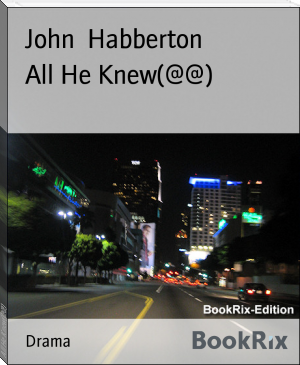All He Knew(@@) - John Habberton (ink ebook reader .txt) 📗

- Author: John Habberton
Book online «All He Knew(@@) - John Habberton (ink ebook reader .txt) 📗». Author John Habberton
When he arose he looked in the direction from which came the rattle of the retreating wheels, and said to himself,--
"I wonder if that man was converted in the penitentiary?"
The story, when Sam told it in the house, amazed the family, though little Mary giggled long on hearing the name of the supposed giver. No sooner was supper ended than the child slipped out of the house and hurried to the hotel to tell her sister Jane all about it. Within half an hour the story had passed, through the usual channels, to all lounging-places that were open, and at one of them--the post-office--it was heard by Deacon Quickset. It troubled the good man a great deal, and he said,--
"There's no knowing how much harm'll be done the fellow by that speech. If he thinks the Lord is going to take care of him in such unexpected ways, he'll go to loafing and then get back into his old ways."
"Didn't the Lord ever help you in any unexpected way, deacon?" asked Judge Prency, who nearly every evening spent a few moments in the post-office lobby.
"Why, yes,--of course; but, judge, Sam and I aren't exactly the same kind of men, I think you'll allow."
"Quite right," said the judge. "You're a man of sense and character. But when Jesus was on earth did He give much attention to men of your general character and standing? According to my memory of the record,--and I've re-read it several times since Sam Kimper's return,--He confined His attentions quite closely to the poor and wretched, apparently to the helpless, worthless class to whom the Kimper family would have belonged had it lived at that time. 'They that are whole need no physician,'--you remember?--'but they that are sick.'"
"According to the way you seem to be thinking, Judge Prency," said the deacon, coldly, "them that's most deserving are to be passed by for them that's most shiftless."
CHAPTER X.page 63"Those who deserve most are those who need most, aren't they, deacon?--that is, if anyone is really 'deserving,' as we use the word."
"Your notions would break up business entirely, if they were carried out," asserted the deacon.
"Not at all; though I've never discovered that business is the first interest of the Almighty."
"You mean to say that because I work hard and get a little fore-handed I ought to take a lot of shiftless folks and teach them to be lazy and dependent on me?"
"Certainly not, deacon. How you do jump at conclusions! There aren't a lot of shiftless people in this town; there are very few; and even they might be helped, and shamed into taking care of themselves, if you and I and some more fore-handed people were to follow our Master's example."
"I've spoken to every unbeliever in this town about his soul's salvation," said the deacon; "I've always made it a matter of duty. Christ came to preach salvation, and I'm following His example, in my humble way."
"Didn't He do anything else?" asked the judge. "You remember what answer He sent to John in prison, when the Baptist seemed to have lost heart and wondered whether Jesus were really He who should come? He said that to the poor the gospel was preached, but He gave half a dozen other proofs, each of them showing special care for men's bodies."
"Judge, you're talking materialism," said the deacon. "It's a spirit that's getting too common everywhere."
"Oh, no, I'm not; I'm talking the words of Jesus Himself. Aren't they good enough for you? or are you like children at the table who will take only what suits them, and ignore everything else?"
"Such talks never do any good, judge," said the deacon, buttoning his overcoat and turning up the collar. "I've spent a good deal of my life thinking about sacred subjects and trying to lead my fellow-men in the right way.
CHAPTER X.page 64You're not going to make me believe at my time of life that I've been all wrong, and that Jesus Christ came on earth only to start a charity society."
"Nor to teach people to live right?"
"He wants them first to know how to die right. I should think, judge, that Sam Kimper had been converting you over again and doing it backwards. That fellow has only got hold of one end of the Scripture--one little jag end of it."
"Too small an end to be worthy of your attention, I suppose, deacon?"
"This is all wasted time and idle talk, Judge Prency," said the deacon, leaving the place so quickly that he forgot to ask for his letters.
CHAPTER XI.page 65One bright, breezy October afternoon, Sam Kimper's daughter Jane got "an hour off" from her duties at the hotel, and proceeded to devote it to her highest ideal of possible enjoyment. There were many other pleasures for which she longed, but, as they were unattainable just then, she made the most of that which was within her reach for the time being. It was to array herself in her best and saunter to and fro in the principal streets, look into shop windows, and exchange winks and rude remarks with young men and women with whom she was acquainted.
Although her attire was about what one would expect of a drunkard's child who had spent her later years in the kitchen and corridors of a hotel, Jane was not an unsightly creature. There must have been good physical quality in one side or other of her family, in past generations, which was trying to reappear, for Jane had a fine figure, expressive eyes, and a good complexion. Had any one followed her during her afternoon stroll, and observed her closely during her successive chance meetings with young men and women of her acquaintance, he would have seen hard lines, coarse lines, ugly lines, in her face; yet when in repose the same face was neither unwomanly nor without an occasional suggestion of soul. It was a face like many others that one may see on the streets,--entirely human, yet entirely under the control of whatever influence might be about it for the time being,--the face of a nature untrained and untaught, which would have followed either Jesus or Satan, or both by turns, had both appeared before it in visible shape.
CHAPTER XI.page 66During a moment or two of her afternoon out, Jane found herself approaching Mrs. Prency and Eleanor, those ladies being out on one of those serious errands known collectively as "shopping."
"Do see that dreadfully dowdy girl!" exclaimed Miss Eleanor, whose attire was always selected with correct taste.
"She has never had any one to teach her to dress properly, my dear," suggested the mother.
"She might have some one who cared enough for her to keep her from appearing in public in red hair and a blue ribbon," said the daughter.
"Such girls have no one to keep them from doing anything they like, my dear. Let us try to be sorry for them, instead of being disgusted."
"But, mother--"
"Sh-h! she'll hear you. I'm going to bow to her; I wish you'd do the same."
"Mother!"
"To oblige me; I'll explain afterwards."
The couple were now within several steps of Jane, who, with an odd mixture of wistfulness and scare, had been studying Eleanor's attire. When she saw both women looking at her, she began to take a defiant attitude, but the toss of her head was met by one of Mrs. Prency's heartiest smiles, accompanied by a similar recognition from Eleanor. Short as was the time that could elapse before the couple had passed her, it was long enough to show a change in Jane's face,--a change so notable that Eleanor whispered,--
"Did you ever see any one alter looks so quickly?"
"Never; but I sha'n't lose any opportunity to see it again," said Mrs. Prency.
"Mother, dear," said Eleanor, "I hope you're not suddenly going to recognize every common person you may meet on the street. You're so enthusiastic."
CHAPTER XI.page 67"And so different from my daughter in that respect,--eh, dear?"
"But, mother,





Comments (0)